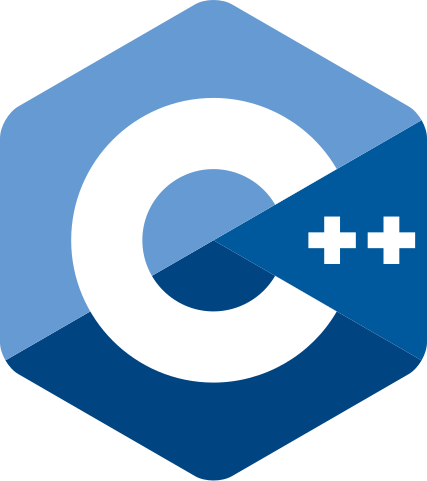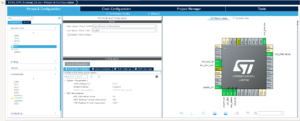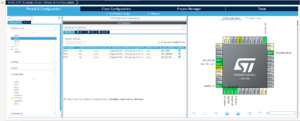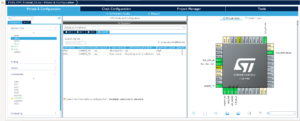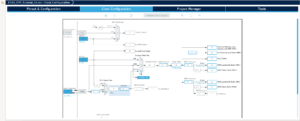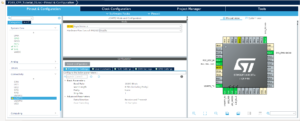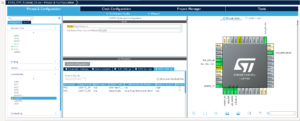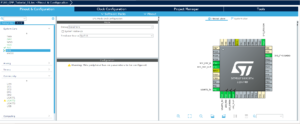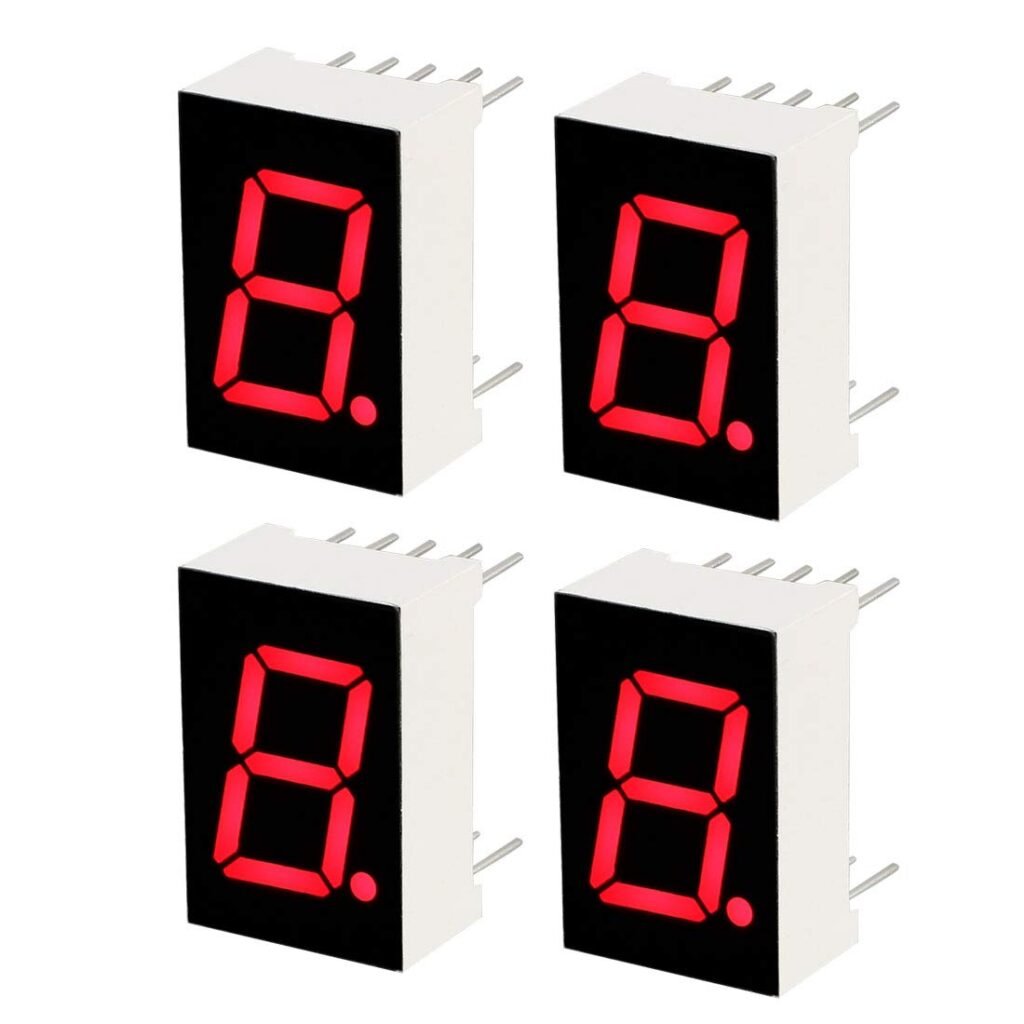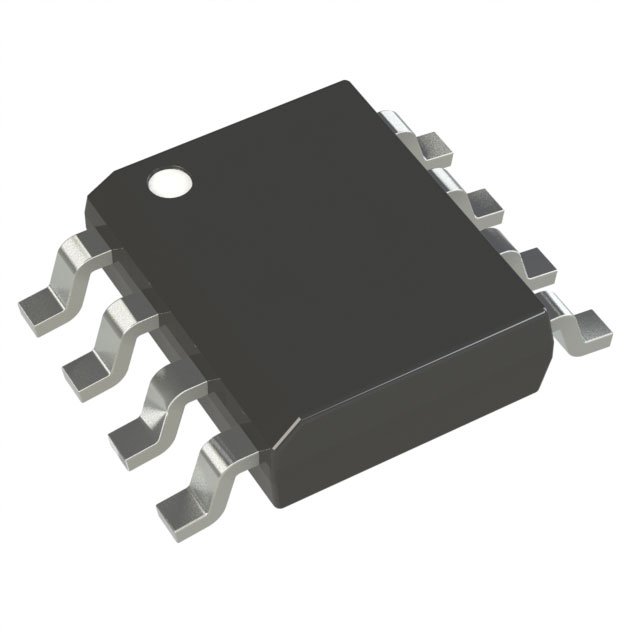Introduction
In this tutorial we will learn how to write C++ code for an STM32 µP. Although STM32CubeIDE does default to C during the creation of a project, you can change this to C++. We will go into details of how to combine the main.c generated code and weave this into classes written in C++.
Many people try to rename main.c to main.cpp, but this is dangerous and it is not recommend that you do this, as you can loose custom code, and this also complicates things as you try to write clean code. One important downside to renaming main.c to main.cpp is that every time you modify something in the configuration using the IOC editor, it will generate a new main.c file NOT a main.cpp. The preferred way is to leave main.c as is without renaming it, and weave C++ code into the project. Writing interface code that you can call from main.c is the best and cleanest way to accomplish this.
If you accidentally forget to create a project using C++, you can always change this anytime after the initial project creation. We will also go into how to accomplish the change in this tutorial.
It’s important to understand how compiling and linking C++ code works and why you can’t just combine it with C code without some extra effort. Here are two articles that might be helpful before proceeding: Name mangling and Name Mangling and extern “C” in C++ On the other hand, you could just follow this tutorial and gather what you need from it!
C++ allows you to have the same function/method name with different types of parameters. For example, you can have class Foo with a method called methodA(long x, long y) as well as methodA(int x, int y)
Both are totally allowed and both accept different parameter types. Because of this, the compiler will Mangle or change the name of these methods to make them unique. This is why you can’t directly call C++ methods from plain C code, because methodA doesn’t really exist, because behind the scenes, the compiler changed methodA(long x, long y) to methodA_aD9iCx01 and changed methodA(int x, int y) to methodA_KDx108DZ to support that these two methods are really different.
To support the combing of C++ and C code they created a way to stop the Mangling. So, you can still create a CPP file with the extension of .cpp, but declare that certain methods inside that source file to not be name mangled. To do this we use the extern “C” statement
extern “C” {
/******* ANY method names declared inside here will NOT be mangled **********/
}
The methods/functions declared inside the above code segment will not be mangled and any C code can refer to these methods just as though they were plain C code.
However, because this code is inside of an .hpp and/or a .cpp source file, they can refer to C++ code inside of them.
Convert C project to C++ project after the Initial Creation
To convert a project from C to C++ just right click on the project name and a menu will pop-up. Select “Convert to C++” and follow the prompts.
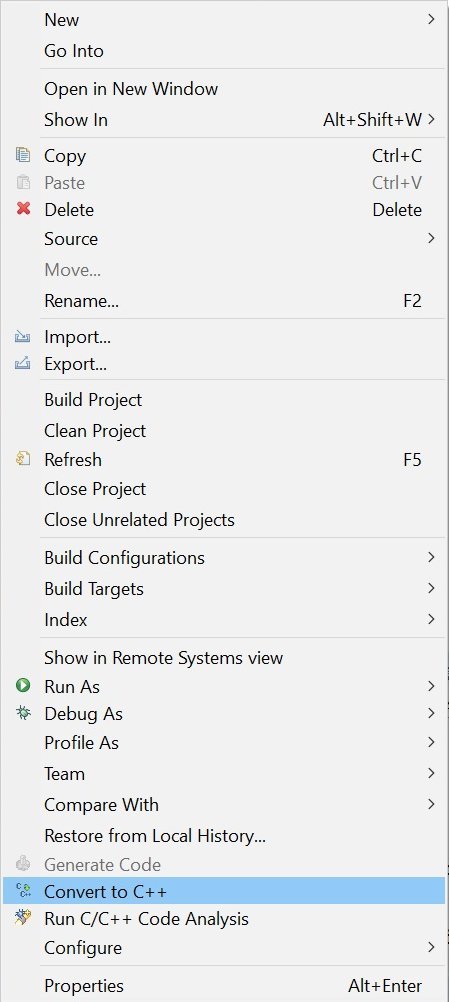
Materials List
- FTDI to USB
- Breadboards Kit Include 2PCS 830 Point 2PCS 400 Point Solderless Breadboards
- NUCLEO-F439Zi
FTDI Pinouts
FTDI to USB Pinout from right to left. The FTDI module is needed to convert the USART RX/TX signals into RS-232/USB such that you can interface with a dumb terminal.
- Pin 1 – GND
- Pin 2 – CTS
- Pin 3 – VCC
- Pin 4 – TX
- Pin 5 – RX
- Pin 6 – DTR
- USB Mini – Connect to PC via USB cable
Make sure the jumper is set for 5v or 3v which ever is being used to power the FTDI device. If we look below at the schematic, it is showing in this case as 5v. Also, validate that any hardware flow control is turned off.
If the dumb terminal emulator you are using has hardware flow control, you probably will not see the response to the <Enter> key being pressed and therefore the master Bluetooth device will not proceed to get configured.
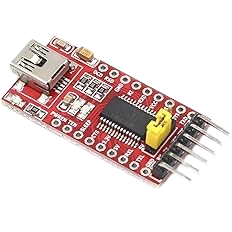
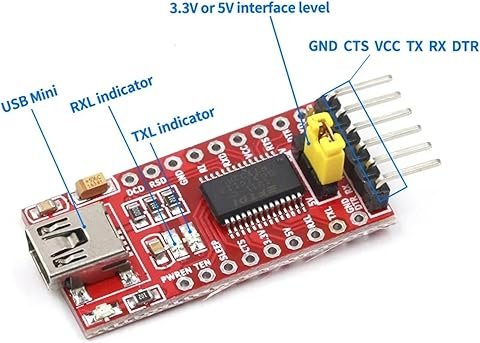
Schematic
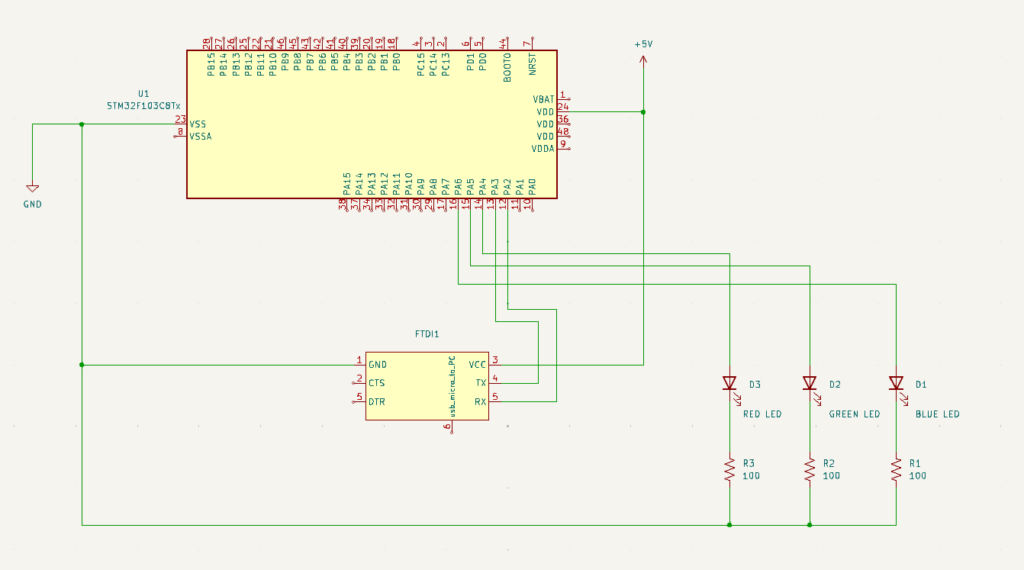
Pinouts & Configurations
Exploring the Source Code
main.h
/* USER CODE BEGIN Header */
/**
******************************************************************************
* @file : main.h
* @brief : Header for main.c file.
* This file contains the common defines of the application.
******************************************************************************
* @attention
*
* Copyright (c) 2025 STMicroelectronics.
* All rights reserved.
*
* This software is licensed under terms that can be found in the LICENSE file
* in the root directory of this software component.
* If no LICENSE file comes with this software, it is provided AS-IS.
*
******************************************************************************
*/
/* USER CODE END Header */
/* Define to prevent recursive inclusion -------------------------------------*/
#ifndef __MAIN_H
#define __MAIN_H
#ifdef __cplusplus
extern "C" {
#endif
/* Includes ------------------------------------------------------------------*/
#include "stm32f1xx_hal.h"
/* Private includes ----------------------------------------------------------*/
/* USER CODE BEGIN Includes */
/* USER CODE END Includes */
/* Exported types ------------------------------------------------------------*/
/* USER CODE BEGIN ET */
/* USER CODE END ET */
/* Exported constants --------------------------------------------------------*/
/* USER CODE BEGIN EC */
/* USER CODE END EC */
/* Exported macro ------------------------------------------------------------*/
/* USER CODE BEGIN EM */
/* USER CODE END EM */
/* Exported functions prototypes ---------------------------------------------*/
/* USER CODE BEGIN EFP */
/* USER CODE END EFP */
/* Private defines -----------------------------------------------------------*/
#define LED_RED_Pin GPIO_PIN_4
#define LED_RED_GPIO_Port GPIOA
#define LED_GREEN_Pin GPIO_PIN_5
#define LED_GREEN_GPIO_Port GPIOA
#define LED_BLUE_Pin GPIO_PIN_6
#define LED_BLUE_GPIO_Port GPIOA
/* USER CODE BEGIN Private defines */
void _Error_Handler(const char *, int);
#define Error_Handler() _Error_Handler((const char *)__FILE__, __LINE__)
#define REDIRECT_PRINTF
/* USER CODE END Private defines */
#ifdef __cplusplus
}
#endif
#endif /* __MAIN_H */
main.c
/* USER CODE BEGIN Header */
/**
******************************************************************************
* @file : main.c
* @brief : Main program body
******************************************************************************
* @attention
*
* Copyright (c) 2025 STMicroelectronics.
* All rights reserved.
*
* This software is licensed under terms that can be found in the LICENSE file
* in the root directory of this software component.
* If no LICENSE file comes with this software, it is provided AS-IS.
*
******************************************************************************
*/
/* USER CODE END Header */
/* Includes ------------------------------------------------------------------*/
#include "main.h"
/* Private includes ----------------------------------------------------------*/
/* USER CODE BEGIN Includes */
#include "stdio.h"
#include "string.h"
#include "stdbool.h"
#include "entryPointCPP.hpp"
/* USER CODE END Includes */
/* Private typedef -----------------------------------------------------------*/
/* USER CODE BEGIN PTD */
/* USER CODE END PTD */
/* Private define ------------------------------------------------------------*/
/* USER CODE BEGIN PD */
/* USER CODE END PD */
/* Private macro -------------------------------------------------------------*/
/* USER CODE BEGIN PM */
/* USER CODE END PM */
/* Private variables ---------------------------------------------------------*/
UART_HandleTypeDef huart2;
/* USER CODE BEGIN PV */
/* USER CODE END PV */
/* Private function prototypes -----------------------------------------------*/
void SystemClock_Config(void);
static void MX_GPIO_Init(void);
static void MX_USART2_UART_Init(void);
/* USER CODE BEGIN PFP */
/* USER CODE END PFP */
/* Private user code ---------------------------------------------------------*/
/* USER CODE BEGIN 0 */
#ifdef REDIRECT_PRINTF
#define PUTCHAR_PROTOTYPE int __io_putchar(int ch)
#endif
#ifdef REDIRECT_PRINTF
/**
* @brief Retargets the C library printf function to the USART.
* @param None
* @retval None
*/
PUTCHAR_PROTOTYPE
{
/* Place your implementation of fputc here */
/* e.g. write a character to the USART2 and Loop until the end of transmission */
HAL_UART_Transmit(&huart2, (uint8_t *)&ch, 1, 0xFFFF);
return ch;
}
#endif
/* USER CODE END 0 */
/**
* @brief The application entry point.
* @retval int
*/
int main(void)
{
/* USER CODE BEGIN 1 */
/* USER CODE END 1 */
/* MCU Configuration--------------------------------------------------------*/
/* Reset of all peripherals, Initializes the Flash interface and the Systick. */
HAL_Init();
/* USER CODE BEGIN Init */
/* USER CODE END Init */
/* Configure the system clock */
SystemClock_Config();
/* USER CODE BEGIN SysInit */
/* USER CODE END SysInit */
/* Initialize all configured peripherals */
MX_GPIO_Init();
MX_USART2_UART_Init();
/* USER CODE BEGIN 2 */
printf("\x1b[2J\x1b[H"); // Clear the dumb terminal screen
printf("Good Day, Mate!!!\r\n");
initLED(LED_RED_GPIO_Port, LED_RED_Pin, LED_GREEN_GPIO_Port, LED_GREEN_Pin, LED_BLUE_GPIO_Port, LED_BLUE_Pin);
/* USER CODE END 2 */
/* Infinite loop */
/* USER CODE BEGIN WHILE */
while (1)
{
blinkRGB();
toggleLEDs();
alternateLEDs();
HAL_Delay(1000);
setStatus();
getStatusAll();
/* USER CODE END WHILE */
/* USER CODE BEGIN 3 */
}
/* USER CODE END 3 */
}
/**
* @brief System Clock Configuration
* @retval None
*/
void SystemClock_Config(void)
{
RCC_OscInitTypeDef RCC_OscInitStruct = {0};
RCC_ClkInitTypeDef RCC_ClkInitStruct = {0};
/** Initializes the RCC Oscillators according to the specified parameters
* in the RCC_OscInitTypeDef structure.
*/
RCC_OscInitStruct.OscillatorType = RCC_OSCILLATORTYPE_HSE;
RCC_OscInitStruct.HSEState = RCC_HSE_ON;
RCC_OscInitStruct.HSEPredivValue = RCC_HSE_PREDIV_DIV1;
RCC_OscInitStruct.HSIState = RCC_HSI_ON;
RCC_OscInitStruct.PLL.PLLState = RCC_PLL_ON;
RCC_OscInitStruct.PLL.PLLSource = RCC_PLLSOURCE_HSE;
RCC_OscInitStruct.PLL.PLLMUL = RCC_PLL_MUL9;
if (HAL_RCC_OscConfig(&RCC_OscInitStruct) != HAL_OK)
{
Error_Handler();
}
/** Initializes the CPU, AHB and APB buses clocks
*/
RCC_ClkInitStruct.ClockType = RCC_CLOCKTYPE_HCLK|RCC_CLOCKTYPE_SYSCLK
|RCC_CLOCKTYPE_PCLK1|RCC_CLOCKTYPE_PCLK2;
RCC_ClkInitStruct.SYSCLKSource = RCC_SYSCLKSOURCE_PLLCLK;
RCC_ClkInitStruct.AHBCLKDivider = RCC_SYSCLK_DIV1;
RCC_ClkInitStruct.APB1CLKDivider = RCC_HCLK_DIV2;
RCC_ClkInitStruct.APB2CLKDivider = RCC_HCLK_DIV1;
if (HAL_RCC_ClockConfig(&RCC_ClkInitStruct, FLASH_LATENCY_2) != HAL_OK)
{
Error_Handler();
}
}
/**
* @brief USART2 Initialization Function
* @param None
* @retval None
*/
static void MX_USART2_UART_Init(void)
{
/* USER CODE BEGIN USART2_Init 0 */
/* USER CODE END USART2_Init 0 */
/* USER CODE BEGIN USART2_Init 1 */
/* USER CODE END USART2_Init 1 */
huart2.Instance = USART2;
huart2.Init.BaudRate = 19200;
huart2.Init.WordLength = UART_WORDLENGTH_8B;
huart2.Init.StopBits = UART_STOPBITS_1;
huart2.Init.Parity = UART_PARITY_NONE;
huart2.Init.Mode = UART_MODE_TX_RX;
huart2.Init.HwFlowCtl = UART_HWCONTROL_NONE;
huart2.Init.OverSampling = UART_OVERSAMPLING_16;
if (HAL_UART_Init(&huart2) != HAL_OK)
{
Error_Handler();
}
/* USER CODE BEGIN USART2_Init 2 */
/* USER CODE END USART2_Init 2 */
}
/**
* @brief GPIO Initialization Function
* @param None
* @retval None
*/
static void MX_GPIO_Init(void)
{
GPIO_InitTypeDef GPIO_InitStruct = {0};
/* USER CODE BEGIN MX_GPIO_Init_1 */
/* USER CODE END MX_GPIO_Init_1 */
/* GPIO Ports Clock Enable */
__HAL_RCC_GPIOD_CLK_ENABLE();
__HAL_RCC_GPIOA_CLK_ENABLE();
/*Configure GPIO pin Output Level */
HAL_GPIO_WritePin(GPIOA, LED_RED_Pin|LED_GREEN_Pin|LED_BLUE_Pin, GPIO_PIN_RESET);
/*Configure GPIO pins : LED_RED_Pin LED_GREEN_Pin LED_BLUE_Pin */
GPIO_InitStruct.Pin = LED_RED_Pin|LED_GREEN_Pin|LED_BLUE_Pin;
GPIO_InitStruct.Mode = GPIO_MODE_OUTPUT_PP;
GPIO_InitStruct.Pull = GPIO_NOPULL;
GPIO_InitStruct.Speed = GPIO_SPEED_FREQ_LOW;
HAL_GPIO_Init(GPIOA, &GPIO_InitStruct);
/* USER CODE BEGIN MX_GPIO_Init_2 */
/* USER CODE END MX_GPIO_Init_2 */
}
/* USER CODE BEGIN 4 */
/**
* @brief This function is executed in case of error occurrence.
* @param file: The file name as string.
* @param line: The line in file as a number.
* @retval None
*/
void _Error_Handler(const char *file, int line)
{
/* USER CODE BEGIN Error_Handler_Debug */
__disable_irq();
#ifdef REDIRECT_PRINTF
char buf[80];
sprintf(buf, "Trapped in Error_Handler(). Called from: %s, line: %d\r\n", file, line);
printf(buf);
#endif
/* User can add his own implementation to report the HAL error return state */
while(1)
{
}
}
/* USER CODE END 4 */
#ifdef USE_FULL_ASSERT
/**
* @brief Reports the name of the source file and the source line number
* where the assert_param error has occurred.
* @param file: pointer to the source file name
* @param line: assert_param error line source number
* @retval None
*/
void assert_failed(uint8_t *file, uint32_t line)
{
/* USER CODE BEGIN 6 */
/* User can add his own implementation to report the file name and line number,
ex: printf("Wrong parameters value: file %s on line %d\r\n", file, line) */
/* USER CODE END 6 */
}
#endif /* USE_FULL_ASSERT */
entryPointCPP.hpp
In the following C Plus Plus include file: .hpp we declare function/method names as being extern “C”. This tells the compiler/linker to prevent name mangling and will allow these to be included in standard C code. See lines #18 and 27 below.
/*
* entryPointCPP.hpp
*
* Created on: Jan 28, 2025
* Author: johng
*/
#ifndef INC_ENTRYPOINTCPP_HPP_
#define INC_ENTRYPOINTCPP_HPP_
#include "main.h"
#include "stdio.h"
#include "strings.h"
#include "stdbool.h"
#ifdef __cplusplus
extern "C" {
#endif
void initLED(GPIO_TypeDef *redPort, uint16_t redPin, GPIO_TypeDef *greenPort, uint16_t greenPin, GPIO_TypeDef *bluePort, uint16_t bluePin);
void blinkRGB();
void alternateLEDs();
void toggleLEDs();
void setStatus();
void getStatusAll();
#ifdef __cplusplus
}
#endif
#endif /* INC_ENTRYPOINTCPP_HPP_ */
entryPointCPP.cpp
Even though we’ve created a source file designated on C Plus Plus or .cpp we can still prevent name mangling by creating stand C-Like methods/function but declare them in the .hpp or include file as extern “C”
All of the highlighted lines of code will NOT be name mangled and will be available to be called within standard C code. All of the proto-type definitions located in the .hpp file are withing the extern “C” clause.
/*
* entryPointCPP.cpp
*
* Created on: Jan 28, 2025
* Author: johng
*/
#include <ManagedLEDs.hpp>
#include "entryPointCPP.hpp"
ManagedLEDs *manageMyLED = NULL;
void initLED(GPIO_TypeDef *redPort, uint16_t redPin, GPIO_TypeDef *greenPort, uint16_t greenPin, GPIO_TypeDef *bluePort, uint16_t bluePin) {
manageMyLED = new ManagedLEDs(redPort, redPin, greenPort, greenPin, bluePort, bluePin);
}
void blinkRGB() {
manageMyLED->setRedLED(ON);
manageMyLED->setGreenLED(ON);
manageMyLED->setBlueLED(ON);
getStatusAll();
HAL_Delay(500);
manageMyLED->setRedLED(OFF);
manageMyLED->setGreenLED(OFF);
manageMyLED->setBlueLED(OFF);
getStatusAll();
HAL_Delay(500);
}
void alternateLEDs() {
manageMyLED->setRedLED(ON);
HAL_Delay(500);
manageMyLED->setRedLED(OFF);
manageMyLED->setGreenLED(ON);
HAL_Delay(500);
manageMyLED->setGreenLED(OFF);
manageMyLED->setBlueLED(ON);
HAL_Delay(500);
manageMyLED->setBlueLED(OFF);
HAL_Delay(500);
}
void toggleLEDs() {
manageMyLED->toggleRedLED();
HAL_Delay(100);
manageMyLED->toggleRedLED();
HAL_Delay(100);
manageMyLED->toggleGreenLED();
HAL_Delay(100);
getStatusAll();
HAL_Delay(100);
manageMyLED->toggleGreenLED();
HAL_Delay(100);
manageMyLED->toggleBlueLED();
HAL_Delay(100);
manageMyLED->toggleBlueLED();
HAL_Delay(500);
}
void setStatus() {
manageMyLED->setRedLED(ON);
manageMyLED->setGreenLED(OFF);
manageMyLED->setBlueLED(ON);
}
void getStatusAll() {
printf("======================================\r\n");
if (manageMyLED->getCurrRedStatus()) {
printf("Red LED is: ON\r\n");
} else {
printf("Red LED is: OFF\r\n");
}
if (manageMyLED->getCurrGreenStatus()) {
printf("Green LED is: ON\r\n");
} else {
printf("Green LED is: OFF\r\n");
}
if (manageMyLED->getCurrBlueStatus()) {
printf("Blue LED is: ON\r\n");
} else {
printf("Blue LED is: OFF\r\n");
}
printf("======================================\r\n");
}
ManagedLEDs.hpp
The follow Include file and it’s .CPP source file are nothing more than a typical C-Plus Plus class. The following methods/functions can be called from the enterPointCPP.cpp source file without any issues.
/*
* ManagedLEDs.hpp
*
* Created on: Jan 28, 2025
* Author: johng
*/
#ifndef MANAGEDLEDS_HPP_
#define MANAGEDLEDS_HPP_
#include "main.h"
#include "stdbool.h"
#define OFF false
#define ON (!OFF)
class ManagedLEDs {
public:
ManagedLEDs(GPIO_TypeDef *redPort, uint16_t redPin,
GPIO_TypeDef *greenPort, uint16_t greenPin, GPIO_TypeDef *bluePort, uint16_t bluePin);
void setRedLED(bool onOff);
void setGreenLED(bool onOff);
void setBlueLED(bool onOff);
bool getCurrRedStatus();
bool getCurrGreenStatus();
bool getCurrBlueStatus();
void toggleRedLED();
void toggleGreenLED();
void toggleBlueLED();
private:
GPIO_TypeDef *redPort;
GPIO_TypeDef *greenPort;
GPIO_TypeDef *bluePort;
uint16_t redPin;
uint16_t greenPin;
uint16_t bluePin;
bool redStatus;
bool greenStatus;
bool blueStatus;
};
#endif /* MANAGEDLEDS_HPP_ */
ManagedLEDs.cpp
/*
* ManagedLEDs.cpp
*
* Created on: Jan 28, 2025
* Author: johng
*/
#include <ManagedLEDs.hpp>
ManagedLEDs::ManagedLEDs(GPIO_TypeDef *redPort, uint16_t redPin,
GPIO_TypeDef *greenPort, uint16_t greenPin, GPIO_TypeDef *bluePort, uint16_t bluePin) {
this->redPort = redPort;
this->greenPort = greenPort;
this->bluePort = bluePort;
this->redPin = redPin;
this->greenPin = greenPin;
this->bluePin = bluePin;
setRedLED(OFF);
setGreenLED(OFF);
setBlueLED(OFF);
}
void ManagedLEDs::setRedLED(bool onOff) {
redStatus = onOff;
if (redStatus) {
HAL_GPIO_WritePin(redPort, redPin, GPIO_PIN_SET);
} else {
HAL_GPIO_WritePin(redPort, redPin, GPIO_PIN_RESET);
}
}
void ManagedLEDs::setGreenLED(bool onOff) {
greenStatus = onOff;
if (greenStatus) {
HAL_GPIO_WritePin(greenPort, greenPin, GPIO_PIN_SET);
} else {
HAL_GPIO_WritePin(greenPort, greenPin, GPIO_PIN_RESET);
}
}
void ManagedLEDs::setBlueLED(bool onOff) {
blueStatus = onOff;
if (blueStatus) {
HAL_GPIO_WritePin(bluePort, bluePin, GPIO_PIN_SET);
} else {
HAL_GPIO_WritePin(bluePort, bluePin, GPIO_PIN_RESET);
}
}
void ManagedLEDs::toggleRedLED() {
redStatus = !redStatus;
if (redStatus) {
HAL_GPIO_WritePin(redPort, redPin, GPIO_PIN_SET);
} else {
HAL_GPIO_WritePin(redPort, redPin, GPIO_PIN_RESET);
}
}
void ManagedLEDs::toggleGreenLED() {
greenStatus = !greenStatus;
if (greenStatus) {
HAL_GPIO_WritePin(greenPort, greenPin, GPIO_PIN_SET);
} else {
HAL_GPIO_WritePin(greenPort, greenPin, GPIO_PIN_RESET);
}
}
void ManagedLEDs::toggleBlueLED() {
blueStatus = !blueStatus;
if (blueStatus) {
HAL_GPIO_WritePin(bluePort, bluePin, GPIO_PIN_SET);
} else {
HAL_GPIO_WritePin(bluePort, bluePin, GPIO_PIN_RESET);
}
}
bool ManagedLEDs::getCurrRedStatus() {
return(redStatus);
}
bool ManagedLEDs::getCurrGreenStatus() {
return(greenStatus);
}
bool ManagedLEDs::getCurrBlueStatus() {
return(blueStatus);
}
